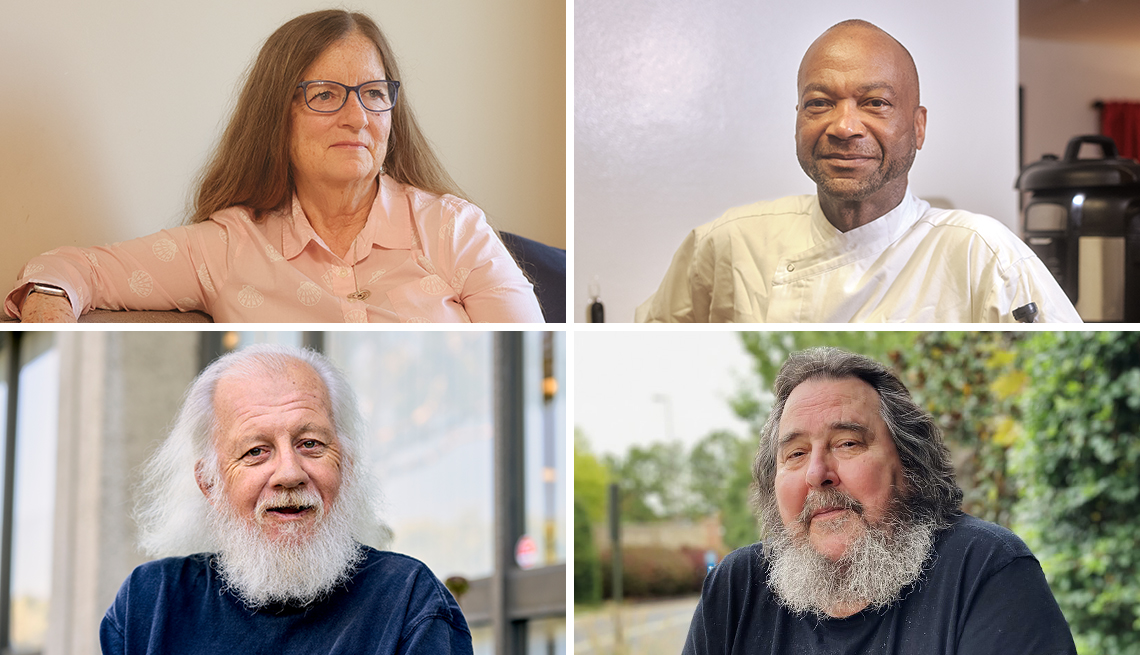
- Select a language for the TTS:
- UK English Female
- UK English Male
- US English Female
- US English Male
- Australian Female
- Australian Male
- Language selected: (auto detect) - EN
Play all audios:
HEALTH ISSUES LED TO HOMELESSNESS Gina Montminy’s apartment in Arlington, Virginia, has black granite countertops, stainless steel appliances and a modern sectional sofa. Rents in her
building start at $1,499. Not a mile away is the homeless shelter where the 67-year-old grandmother once lived. Her earlier years didn’t signal the hard times to come. She was an Air Force
colonel’s daughter. She was married for 25 years before she and her husband called it quits. She raised three sons, all engineers. And she worked for decades, often waitressing. A lifelong
epileptic, she was divorced and working at a 7-Eleven as a cashier when she had a grand mal seizure in 2013. Under Virginia law, the driver’s license of a person who has a seizure must be
suspended. And, since her doctor said she could no longer work, she couldn't pay her mortgage. “My life was a shambles in one day,” Montminy says. “The minute I woke up … I knew that
I’d lost my house, I would lose my car, I will lose my driver’s license, I will lose what I consider freedom, because any shelter is an institution.” She sold her home and stayed with
relatives or rented an apartment, including near a sister in Minnesota. Rent, doctor’s bills and other expenses ate up the $25,000 in equity she pulled from the home sale, she says. By
2016, she entered the Arlington shelter, where for six weeks she slept on a “thin piece of foam rubber” until a bed opened up. Nights were restless. “Nobody’s getting good sleep,” she says.
“Everybody’s irritable. … Nobody really came to the shelter because life was good.” She says she was bullied and threatened, and once a female resident of the shelter shoved her in the
face. She kept her spirits up by taking long walks, sewing and listening to music. After nine months in the shelter, she qualified for Permanent Supportive Housing (PSH) benefits through
the U.S. Department of Housing and Urban Development, which pays most of her rent in the apartment that has been home for six years. “I feel like I’m a survivor,” she says. “I still think
it’s a badge of courage that I made it through and came out on the other side.” Veteran Greg Spraul now has a studio apartment after being homeless. Philip Cheung VETERAN TRIES TO PUT
CHAOS BEHIND For almost 70 years, Californian Greg Spraul lived the good life. He worked in sales, in direct marketing and in radio. He owned a limousine business. He’s done gig work
delivering food. But a 2019 fire in the San Diego condo building where Spraul lived with his second wife marked a turning point. The couple’s condo was spared from the blaze but became
uninhabitable because sprinklers drenched the unit. The two moved in with a brother-in-law but then split up. Thus began Spraul’s descent into homelessness. After leaving a
brother-in-law’s home, Spraul lived in Escondido, California, in an Airbnb room costing $950 a month. The rent gobbled up much of his Social Security benefits, and when the rent jumped even
higher, he moved into his 1998 Mazda truck. Sleeping in his truck, he could only nod off for a few hours at a stretch. Finding a toilet could be tough. A basket of his clothes was stolen.
So was his bicycle. Spraul, 72, a Vietnam-era Air Force reservist, occasionally lived in San Diego in budget motel rooms subsidized for veterans. “I’ve been down and depressed, and sat in
my room and said, _What the hell am I doing?_” he recalls. “And I didn’t think about suicide, but I betcha I was getting close to it.”








